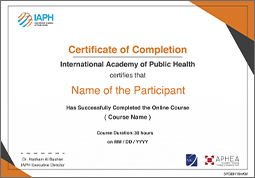Prevention and Control of Noncommunicable Diseases
Description
This course addresses the prevention and control of major non-communicable diseases including cardiovascular disease, diabetes, cancer, chronic lung disease, mental disorders and injuries. This course is intended to increase the capacity of trainees and provide them with the skills to develop and implement multisectoral plans for prevention and control of non-communicable diseases, taking into account international recommendations and approaches.
The course will present and discuss current international strategies for prevention and control of chronic non-communicable diseases. Moreover, it addresses public health strategies to curb non-communicable diseases, and changes needed in the health care system, particularly with regards to those most effective, affordable and scalable ‘best buys’ interventions.
Learning Outcomes
- Comprehend the most cost-effective and affordable public health interventions and key ‘best buys’ for the prevention and control of non-communicable diseases and relate them to health systems strengthening
- Explain the most critical elements needed to strengthen health care services for the delivery of cost effective management of non-communicable diseases
- Identify the rationale, benefits, and resources needed for implementing the interventions for the prevention and control of non-communicable diseases
- Propose national interventions and programs related to social determinants of health and to non communicable diseases prevention
- Conceptual framework for NCDs prevention
- Health Promotion Theories and Theories of Behavior Change
- Designing Health Promotion Interventions and Putting Health Promotion Evidence Into Practice
- Main Approaches for Prevention and Control of NCDs


Certificate
